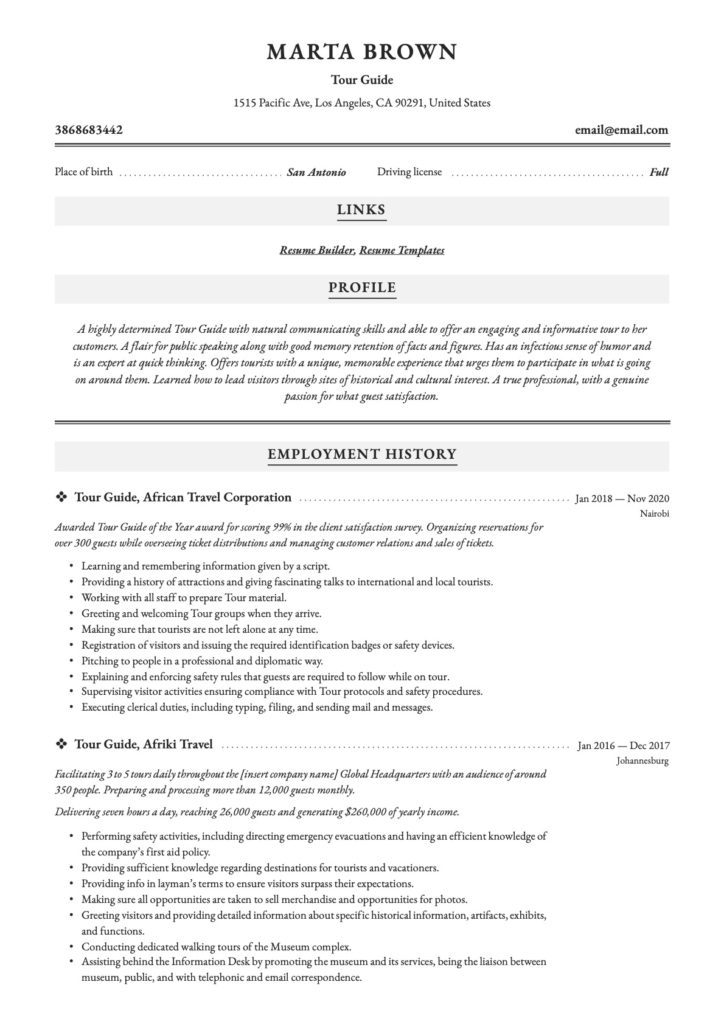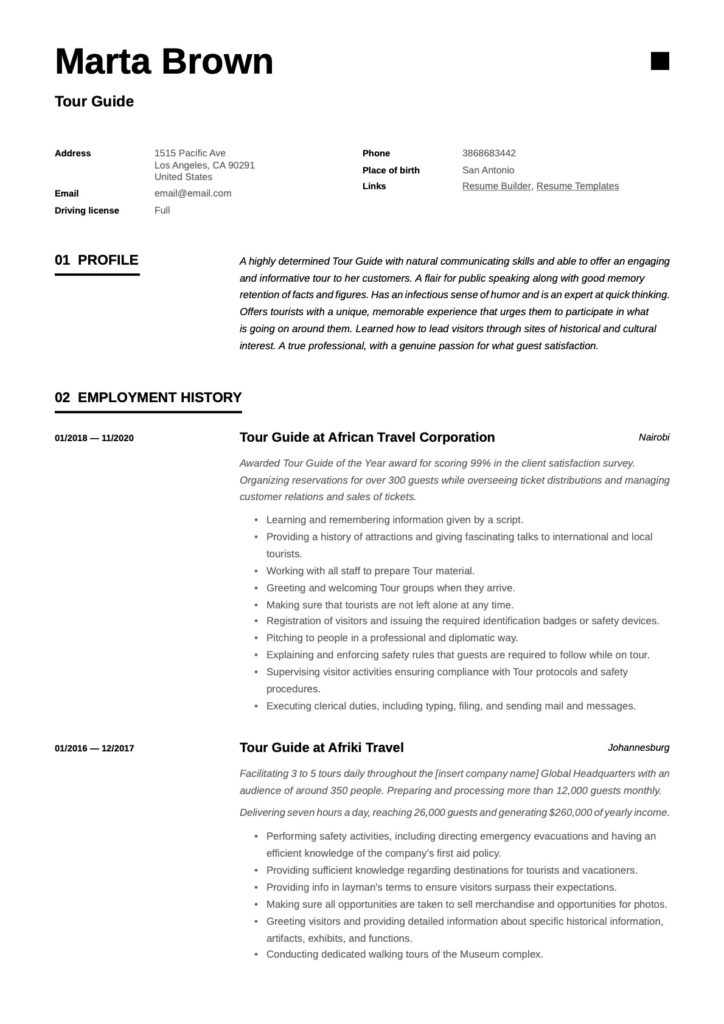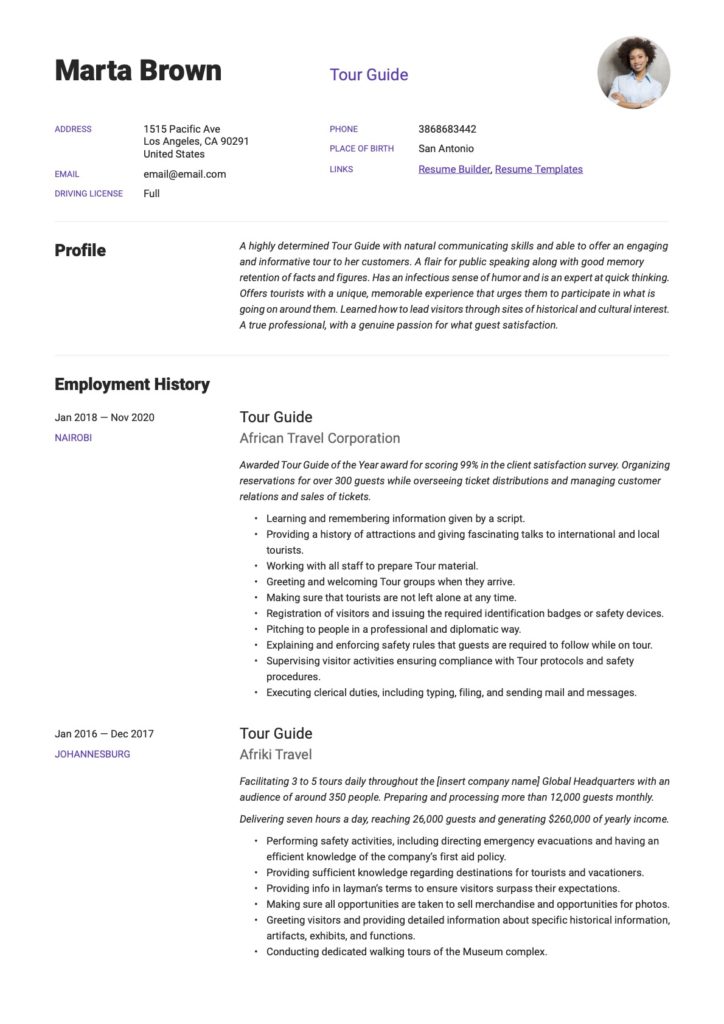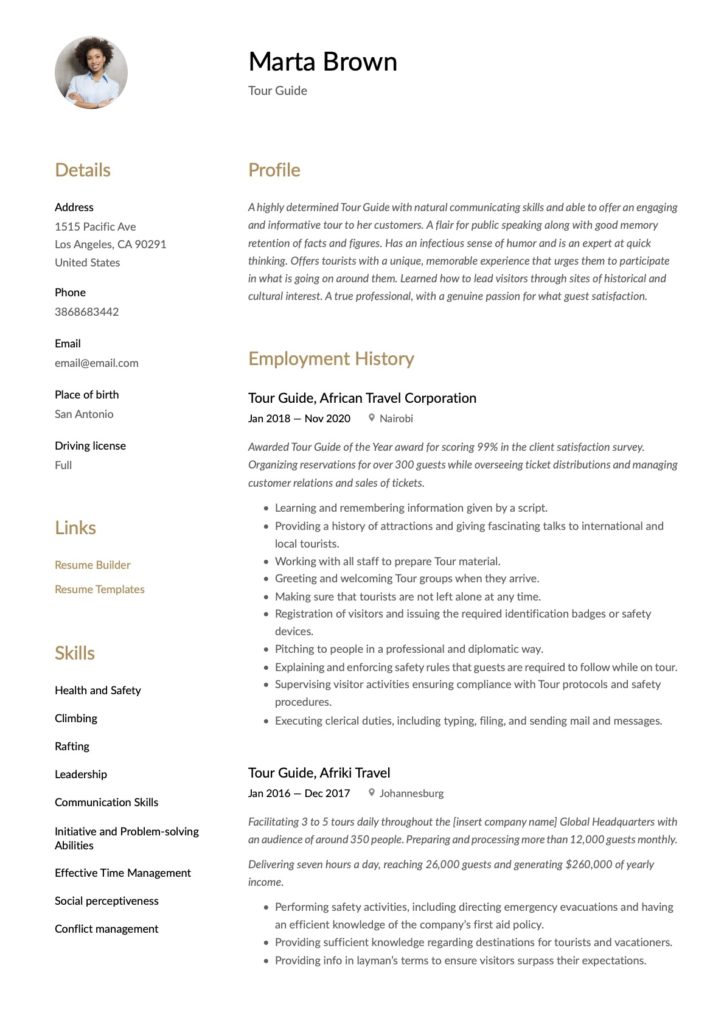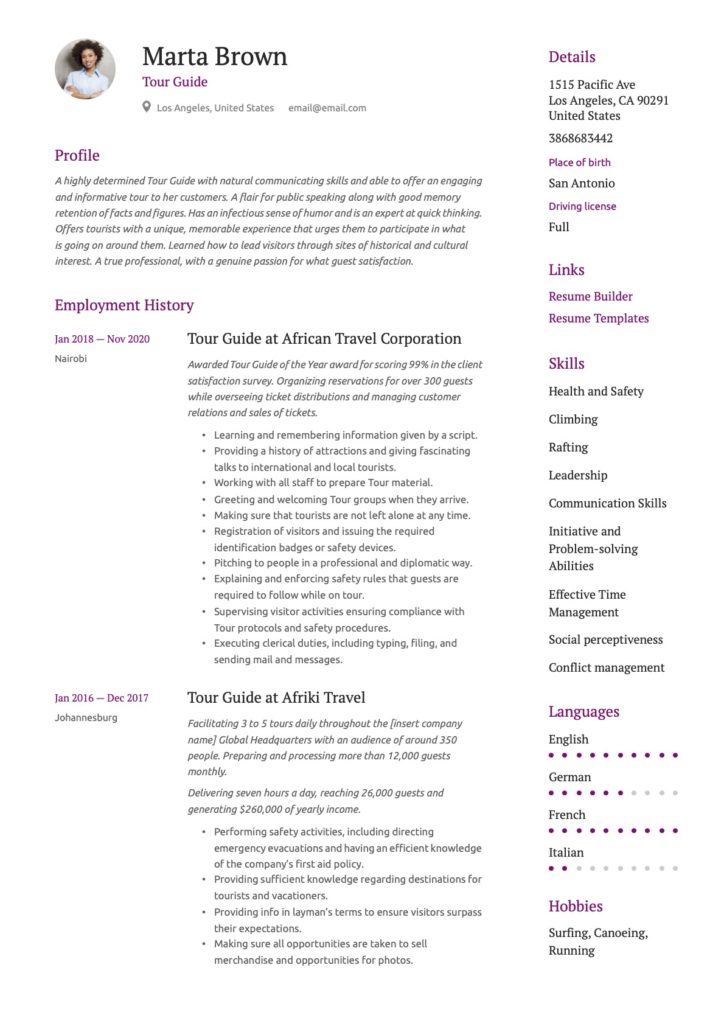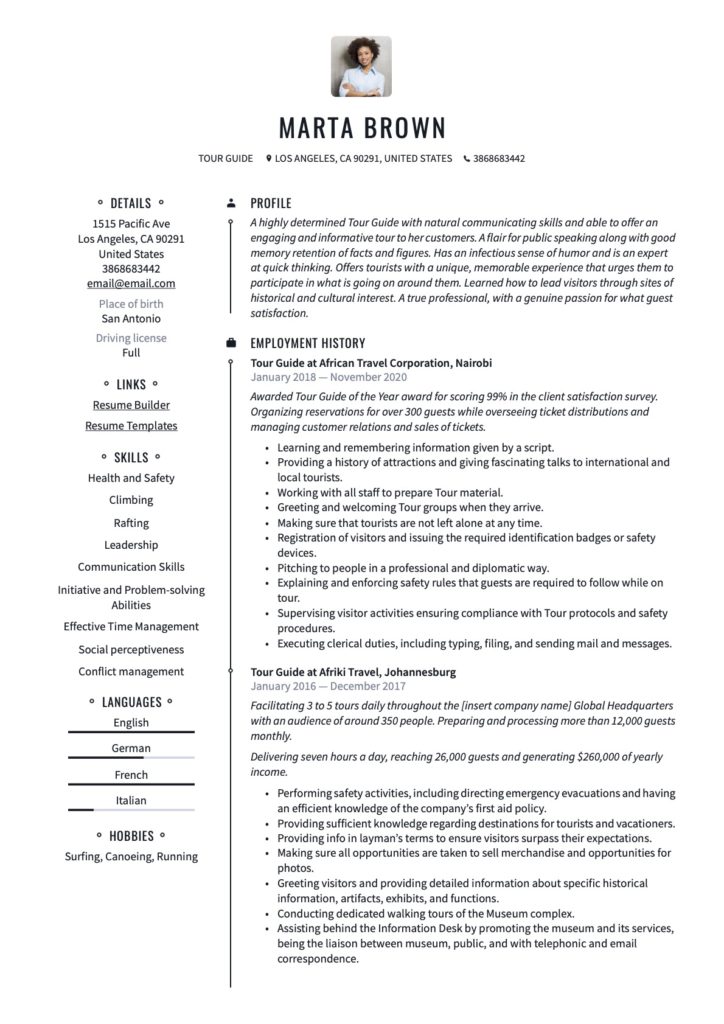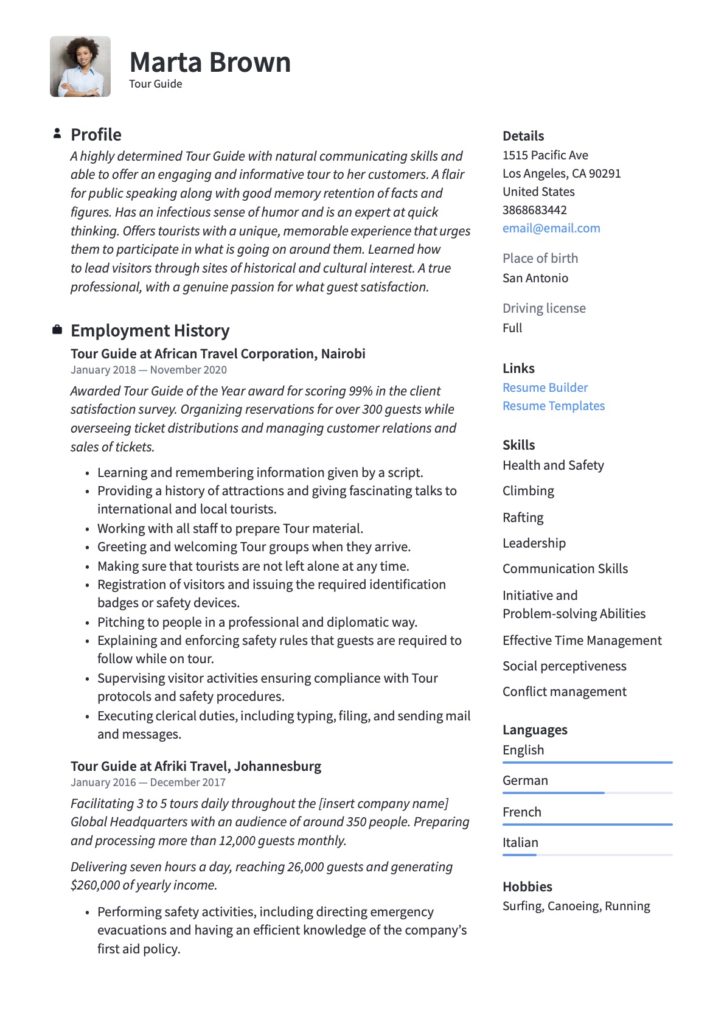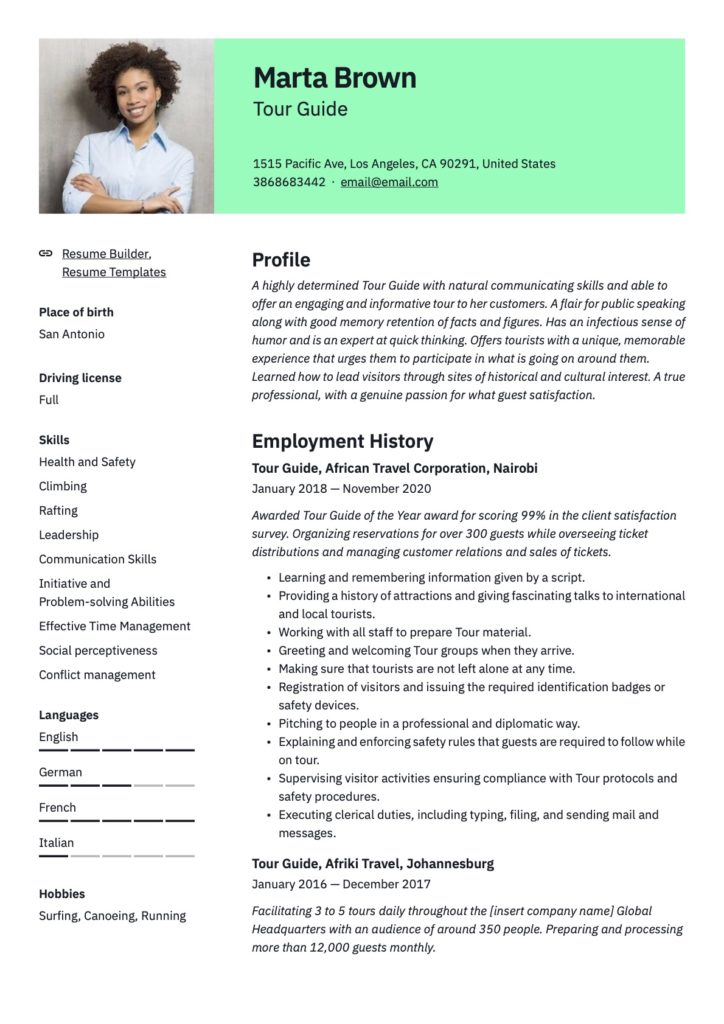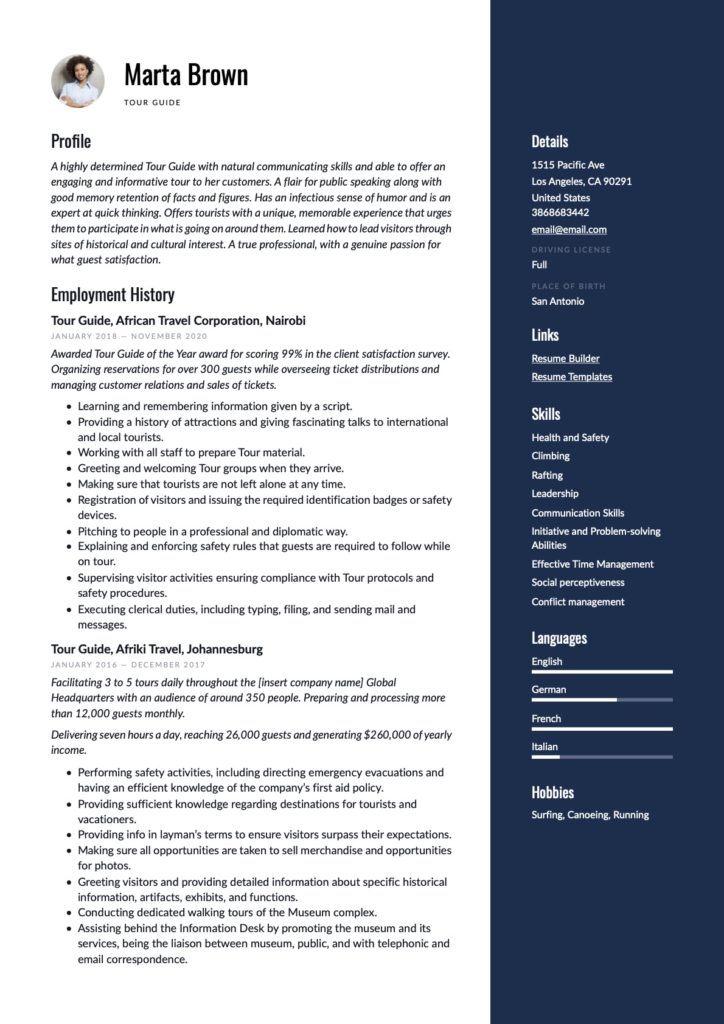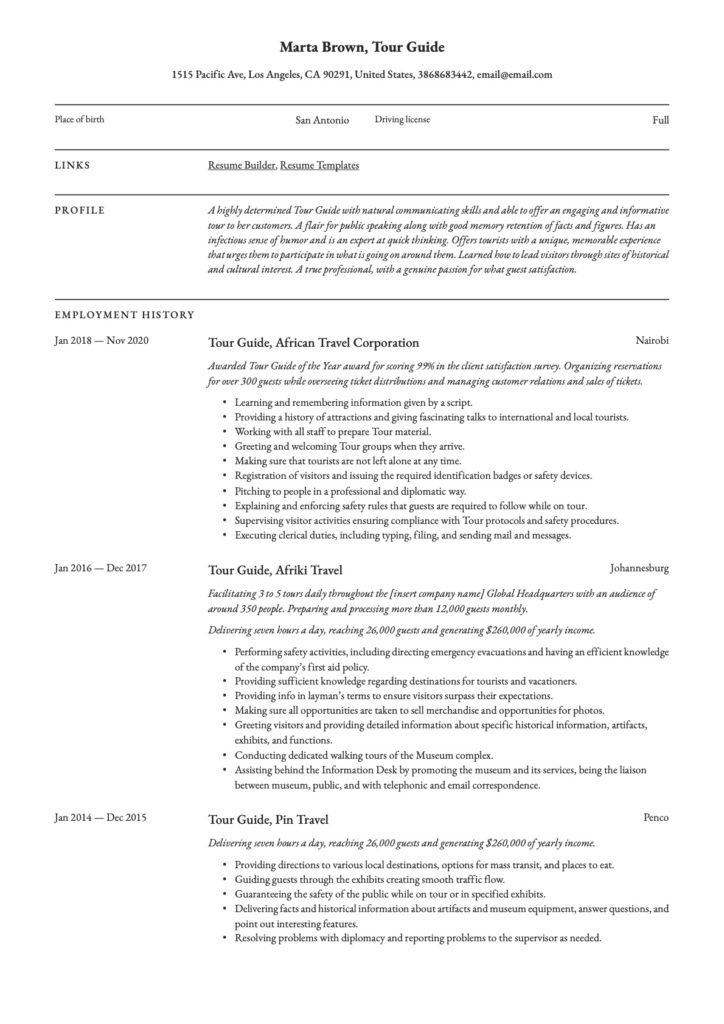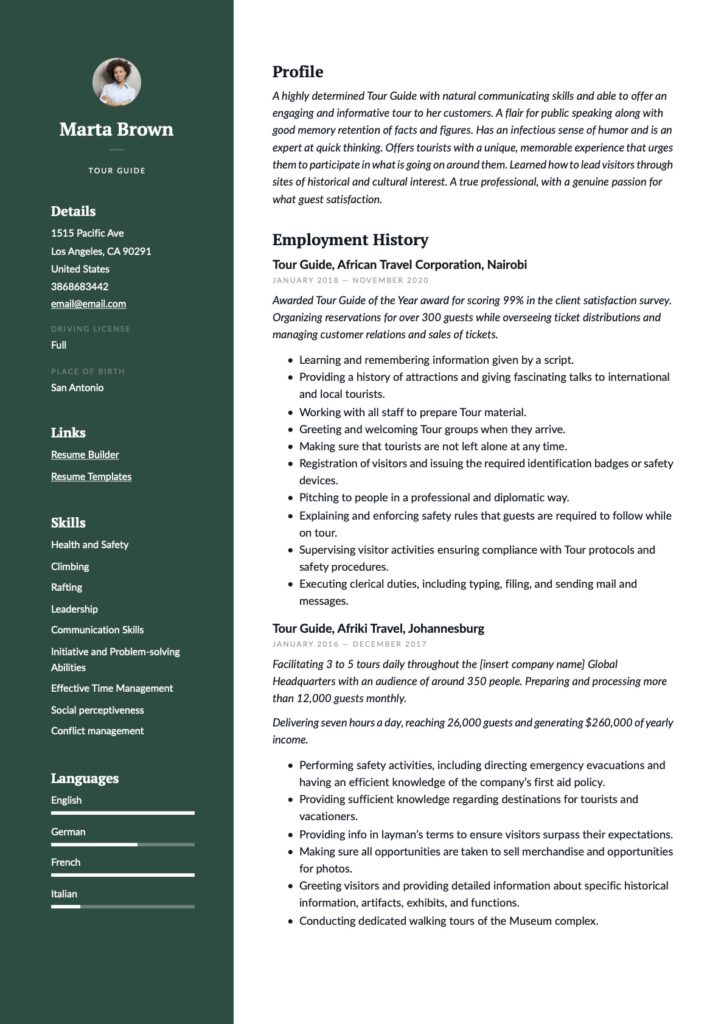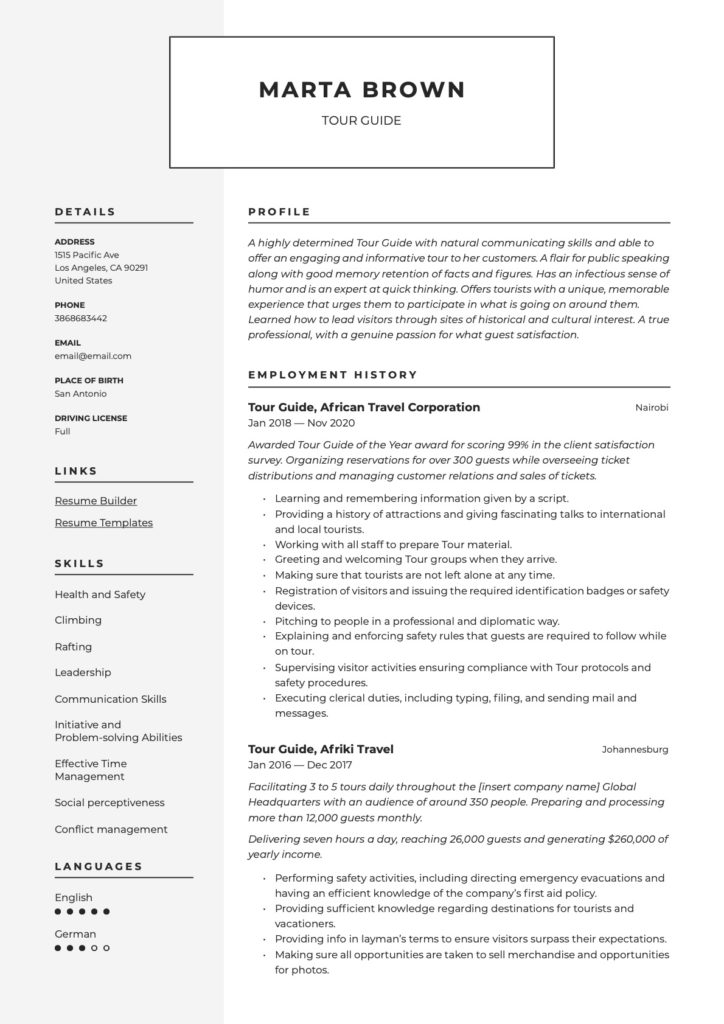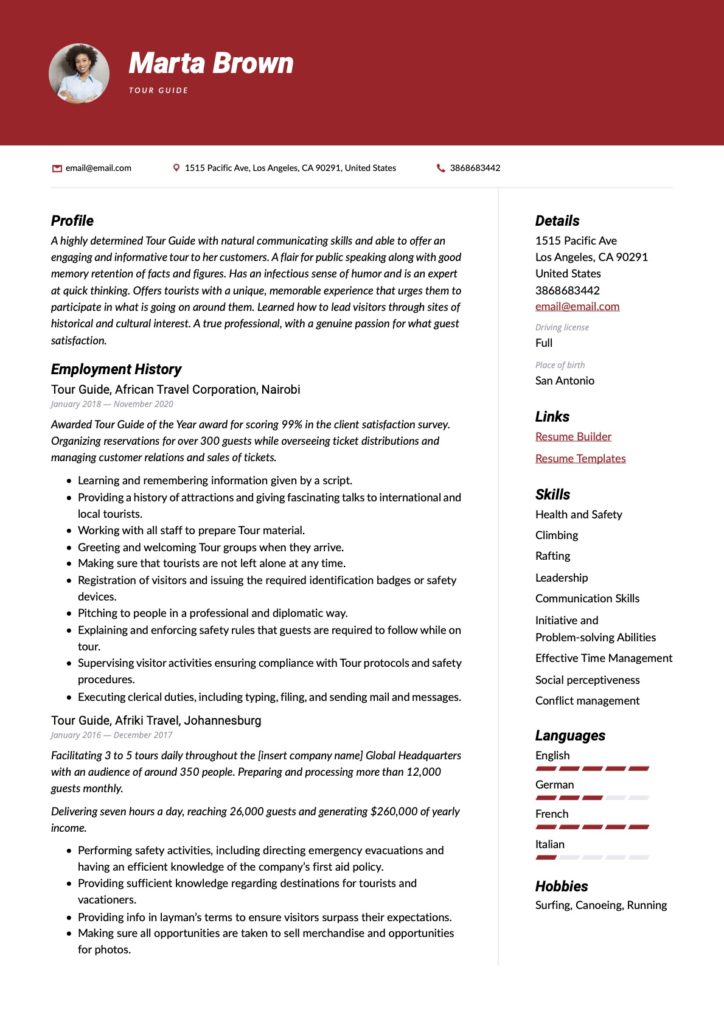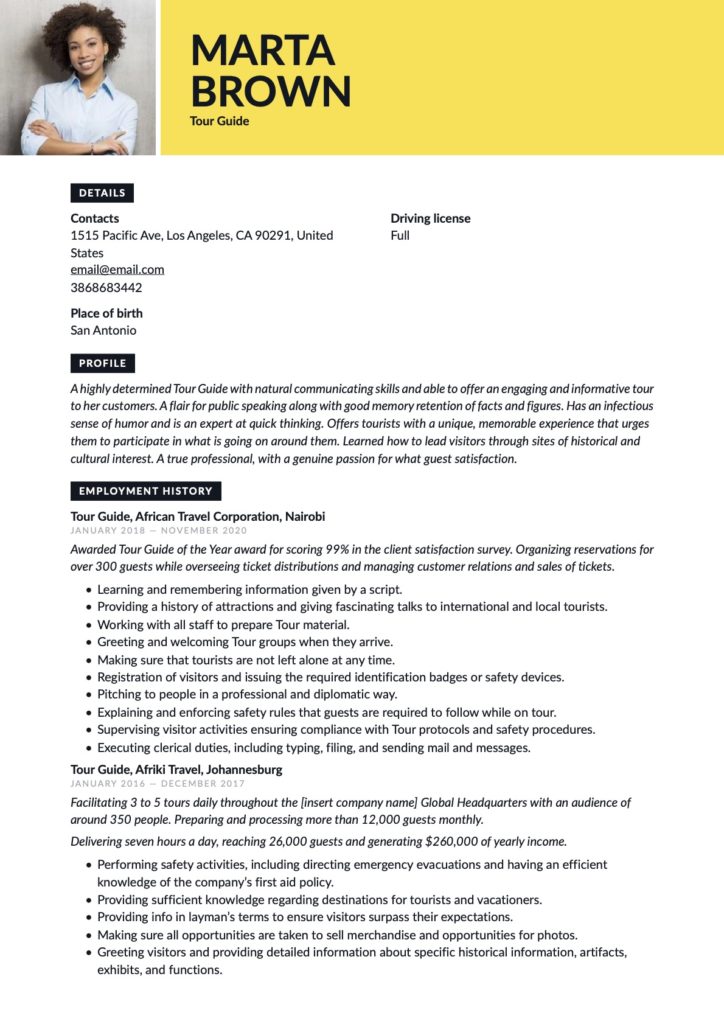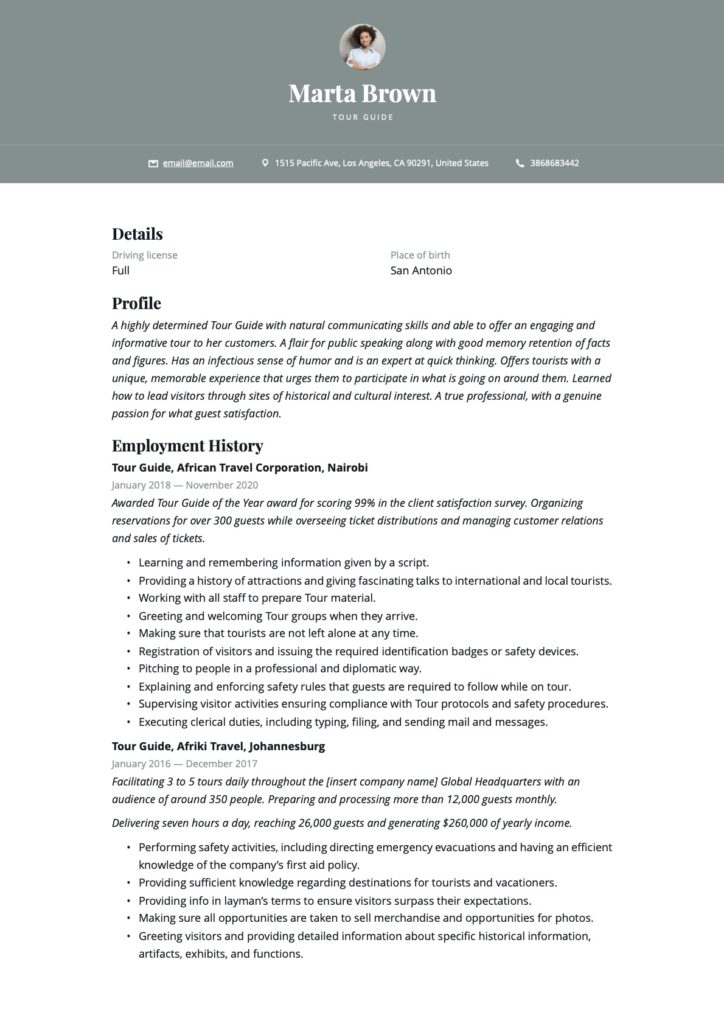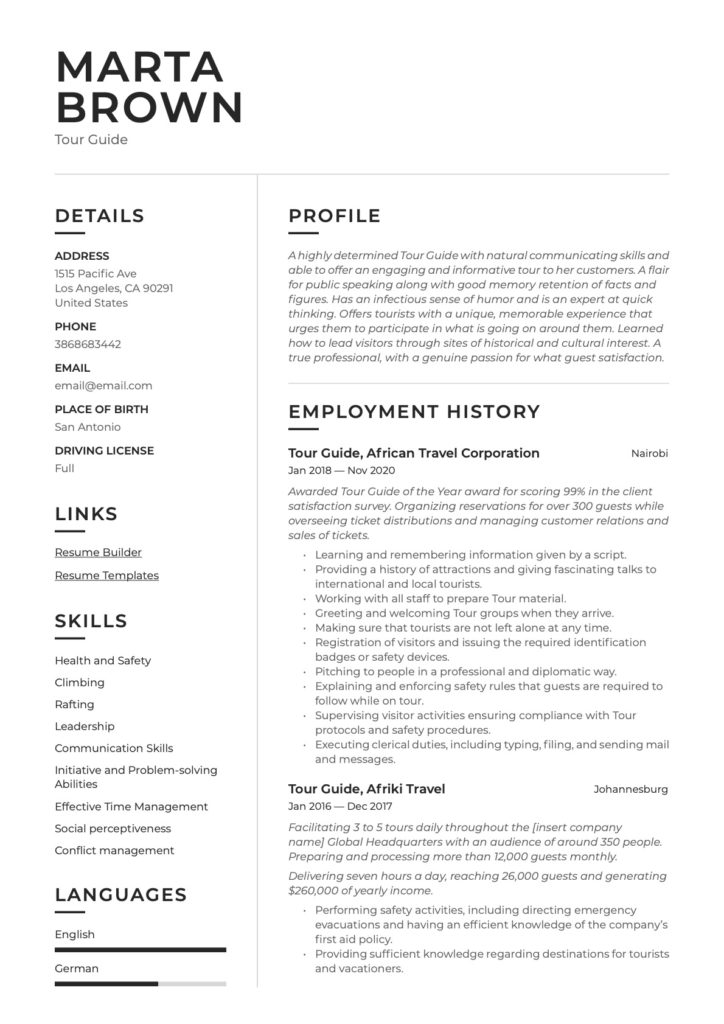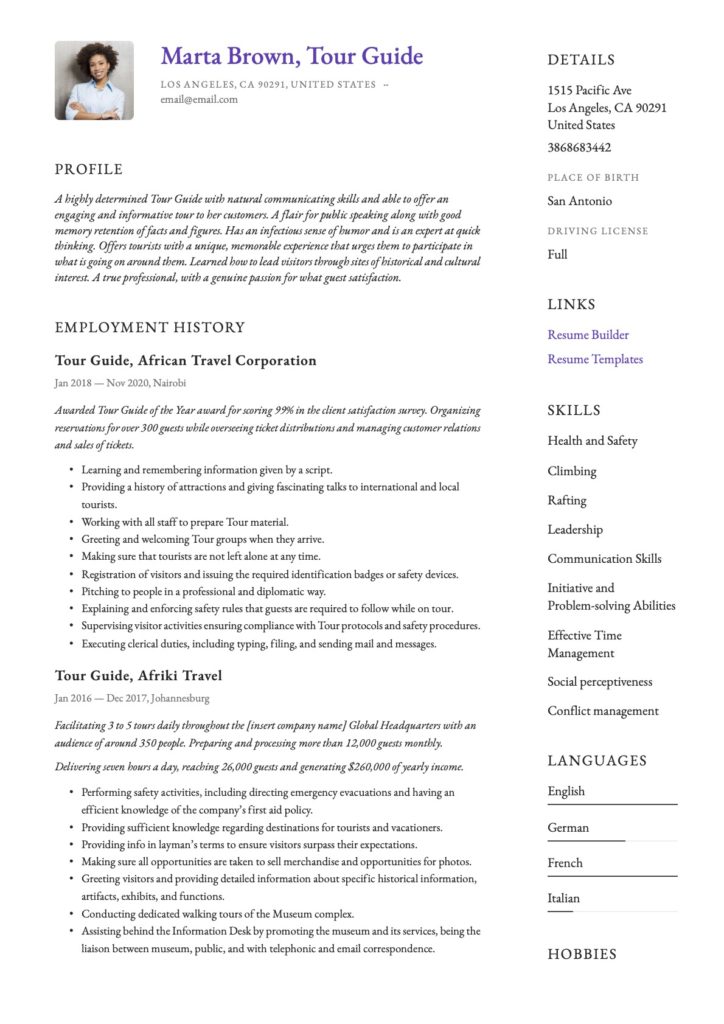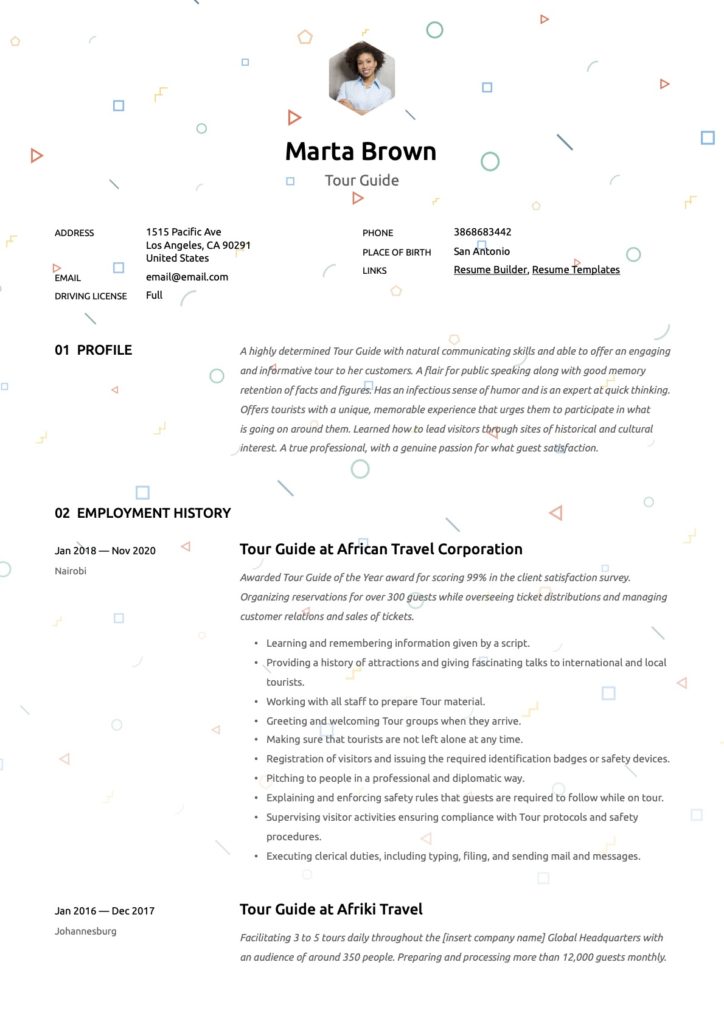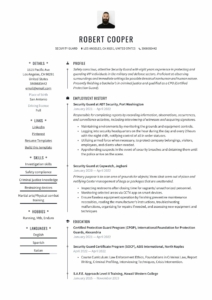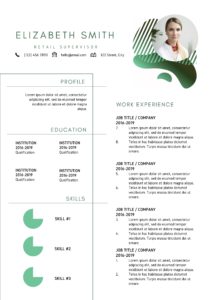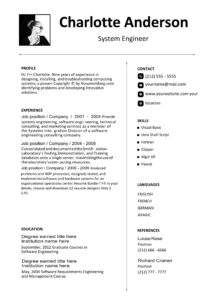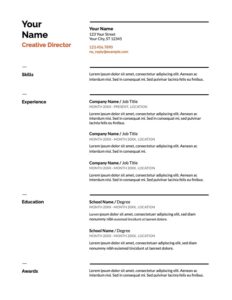If you can’t bear to think about a career behind a desk, look no further. Below are examples of Tour Guide resume samples and guidelines to help you set up a rocking resume to land you that dream job as a Tour Guide!
Tour Guides are the country’s representatives. You meet them first when you arrive and often will be the last to wish you farewell.
Take a read through the write-up below if you want to learn about the most significant parts of a resume, including how you should be writing your career summary, compiling job descriptions, listing your education in the right way, and stringing together eyeball-melting accomplishment statements.
What you can read in this article
17 Tour Guide Resume Examples
(Free sample downloads are at the bottom of this page)
– Tour Guide Resume Writing Guide –
Resume Sections
- Contact information
- Profile Summary
- Work History
- Achievements
- Education
- Skill Section
- Certification & licensing
- Extras: Languages/Awards/Publications/Volunteering/hobbies
- > Professional information
1. Contact information
- First Name and Last Name
- Physical Address
- LinkedIn Profile / Portfolio Link
2. Career Summary:
See this as your intro to your resume and include 2-3 sentences presenting your background comprehensively, including how long you’ve worked in the industry, and the different environments you’ve worked in.
If you know how to do Tinder, use the same methods you use to attract your next date on your next hiring manager.
Our HR stats tell us 7 seconds is all it takes for the guys hiring to decide on your resume and if it hits the HOT vs. NOT pile. This is why it’s crucial to nail the professional resume heading statement. You’ve got to make a witty statement that makes you look good.
3. Education/Licenses/Certifications/Relevant:
Tourist guiding is regulated by national legislation and guidelines. You have to do specific training if you want to be a Tour Guide. The relevant State’s Qualifications Authority must register that qualification. Once you are competent, you will receive a qualification issued by the Culture, Arts, Tourism Hospitality and Sports Sector Education and Training Authority appropriate to the State you’re in.
Make sure to provide accurate details of the qualifications and certifications you have accomplished. Definitely put down any relevant memberships to industry bodies or groups. I
If you are busy finishing a degree, diploma, or program at this time, providing information about that is also essential. Different cities and companies require their guides to have additional requirements.
While working in this area, you will typically get on-the-job training from your employers, learning basic and advanced skills. Certified Tour Professional qualifications given by the National Tour Association and the Sustainable Tourism Eco-certification provided by Sustainable Travel International are appropriate qualifications to have.
4. Relevant Tourism Experience:
Guiding tourists is an essential part of the tourism value chain. You play a critical role in guaranteeing tourists to come back again after their visit by building a country's positive image or State. Don’t use any experience in your resume for older than ten years. Your resume must not be longer than two pages max, so use concise sentences with bullet points. Then make sure to list your most recent positions first in the resume, followed by the older ones in reverse chronological order.
5. Other Employment Experience:
Add in short explanations of projects and/or experience related to your current Tour Guide position. Otherwise, make a table showing your work history stating only the job title, company, and how long you worked there for.
6. Skills Summary/Key Skills:
Now that many big companies rely on computers to start the initial stages of recruiting, you must understand that their algorithms look for keywords in your resume and then give you a score. To get a high score and reel in an interview, tailoring your resume is critical. Your experience section in the resume is where you’ll do most of the tailoring.
To adapt your resume, go to the job description, and look for resume keywords relating to your duties. Use the job advertisement's crucial keywords as “resume SEO” verbiage to add indispensable authority to your resume.
What to Highlight in a Tour Guide Resume
Typically, a Tour Guide works in a particular location, city, or province, and some can even guide throughout a whole country. They guide visitors in their choice of language and explain their guiding area's natural history and culture. You will need specific qualifications to do this, and these specifications will be recognized and issued by the appropriate people.
There are super essential things hiring managers must know about you to determine if you will fit in their company.
1. You must give information about your working environment.
Tour Guides work in varied conditions and environments. Museum Tour Guides, for example, work the whole year indoors. Nature Tour Guides work outside and are affected by the weather and climate. A Tour Guide’s workweek is usually structured, and they might work more or less than 40 hours, including work on the weekends. Some guides are also only on a seasonal basis when the tourism season is booming.
2. Defining your purpose in terms of the type of tour guiding:
Your job as a Tour Guide depends on where you work and whom you work for. If they are self-employed, the tours are usually to places like game reserves or natural attractions. If a visitor’s bureau or corporation employs you, your tours will be of cities and interest points within them. The guiding industry's three main specialized areas are historical tour guiding, corporate tour guiding, and nature/ eco-tour guiding.
- Historical Tour Guides give tours of national historical sites, monuments, religious or archaeological sites, historic districts, and museums. These guides are well-informed in the history of the attractions. They give tourists a fascinating description of the location, providing its history and its effect on modern society. They also answer questions and keep the tour running safely and smoothly.
- Corporate Tour Guides work for big companies, usually a distinguished corporations or travel destinations, although non-profit organizations often need directions too. They guide groups through factories, explaining the manufacturing process, history, and mission of the businesses. Theme parks often employ Tour Guides who give tours of the museum that record its history of accomplishments. Guides also work in wildlife refuges, zoos, safari lodges, or nature reserves, educating clients on animal behavior and company goals.
- Nature Tour Guides work at natural attraction locations, nature reserves, and various outdoor locations where they focus on wildlife and the environment. These guides have expertise in biological sciences and can engage the clients with knowledge of the local fauna and flora and the land's geology. Eco-touring is an area of the industry that is growing fast. Eco-Tour Guides take small groups into protected but breathtaking natural areas, impacting the environment in the slightest way possible. Clients are educated on human impact on the environment while the guide attempts to create a sense of connection and love with the environment.
3. Next up, emphasize the purpose of your role:
Tour Guides help people to visit hard-to-reach areas. They usually take clients on trips to show them significant places. Their work is essential for clients, especially first-time visitors, to offer much insight into the client’s destination. Some responsibilities are imperative to perform, regardless of what your specialization as a Tour Guide might be.
4. Planning & Organizing:
Tour Guides usually plan itineraries, research thoroughly before commencing with the tour, and prepare and organize for every step of the process, from greeting clients on arrival to arranging transport between destinations. Describing places to people is also part of the job. Accompanying groups on cruises. Giving directions to tourists.
5. Tourism Safety:
Your most important responsibility is making sure the tour is safe for the whole group. You will be monitoring the group’s activities to guarantee everyone obeys the site’s or guide’s safety rules. You must be able to provide first-aid or emergency services to tourists.
6. Admin:
Guides must also complete clerical duties, collect fees, and help sell merchandise and market the gift stands.
Finally, explain one or two interpersonal traits that you have that are important to the job you’re applying for. It is essential to make sure you’re an expert in your chosen field. You must be able to answer any questions about artifacts, places, the place’s history, and features. Good communication skills are non-negotiable if you want to survive in this line of work. Tour guides must also be professional and organized, on time, and ethical. You must possess remarkable time-management skills and be able to research relevant information well. If you can speak more than one language, that will definitely put you in the front-runners group for the job.
*Cool Tip for a stellar resume
Even as a Tour Guide, you should be up to date with the latest tech applications and software. You can create an exceptional first impression by including a “tools table” in your Tour Guide resume (see example below).
| FareHarbor | TRYTN |
| Xola | TrekkSoft |
| Checkfront | Travefy |
| Trello | Airtable |
| Slack | Checkfront |
| Adalte | Rezdy |
Tour Guide Career Summary
The guys looking to hire you are very busy and don’t have much time to look through all the resumes. That’s why yours has to grab their attention from the start! Make sure your career summary is short, meaty, and to the point.
- Begin your career summary with your years of industry experience and emphasize one or two “wow factors” or accomplishments. Try to line up your achievements with the job description's essential duties in the “purpose of the role” part of the job advertisement. Let’s say the job you’re applying for wants innovation of products and continuous improvement. Think of something you’ve done that highlights those aspects.
- The next step includes a line that highlights any exceptional soft skills or personality traits that add value to the company. The big man hiring is interested to know if you have “strong leadership skills, strategic thinking abilities, and a flair for statistics, metrics and production ratios.” These qualities must be proven with examples in the “professional experience” section to strengthen your message.
- Lastly, finish up your summary with your highest qualification or most significant memberships (work-related, of course).
Example Tour Guide Summaries:
Tour Guide Summary Example 1
“Passionate and adaptable graduate from Penn State University with a BA in communications (GPA 3.8). Excited to join the Wildland Adventure Company to enrich its offer with exceptional storytelling and outdoor culinary skills. Previous tenure as a front country and campus Tour Guide. Awarded Tour Guide of the Season in 2019.“
Tour Guide Summary Example 2
“A highly determined Tour Guide with natural communicating skills and able to offer an engaging and informative tour to her customers. A flair for public speaking along with good memory retention of facts and figures. Has an infectious sense of humor and is an expert at quick thinking. Offers tourists with a unique, memorable experience that urges them to participate in what is going on around them. Learned how to lead visitors through sites of historical and cultural interest. A true professional, with a genuine passion for what guest satisfaction.”
Tour Guide Summary Example 3
“Spirited professional with five years of experience providing information and guiding museum tours. Excellent talent for entertaining tour members and providing a high level of customer service. Broad knowledge of history and visual arts; able to memorize and learn large amounts of information quickly.“
Tour Guide Job Descriptions, Responsibilities, and duty Examples
Tour Guide roles are numerous in almost all business sectors. Below are a few examples we selected for you to start you off on your own resume.
A Tour Guide in an Architectural Environment may:
- Learning and remembering information given by a script.
- Providing a history of attractions and giving fascinating talks to international and local tourists.
- Working with all staff to prepare Tour material.
- Greeting and welcoming Tour groups when they arrive.
- Making sure that tourists are not left alone at any time.
- Registration of visitors and issuing the required identification badges or safety devices.
- Pitching to people in a professional and diplomatic way.
- Explaining and enforcing safety rules that guests are required to follow while on tour.
- Supervising visitor activities, ensuring compliance with Tour protocols and safety procedures.
- Executing clerical duties, including typing, filing, and sending mail and messages.
- Performing safety activities, including directing emergency evacuations and having an efficient knowledge of the company’s first aid policy.
- Providing sufficient knowledge regarding destinations for tourists and vacationers.
- Providing info in layman’s terms to ensure visitors surpass their expectations.
- Making sure all opportunities are taken to sell merchandise and opportunities for photos.
- Greeting visitors and providing detailed information about specific historical information, artifacts, exhibits, and functions.
- Conducting dedicated walking tours of the Museum complex.
- Assisting behind the Information Desk by promoting the museum and its services, being the liaison between museum, public, and with telephonic and email correspondence.
- Providing directions to various local destinations, options for mass transit, and places to eat.
- Guiding guests through the exhibits creates smooth traffic flow.
- Guaranteeing the safety of the public while on tour or in specified exhibits.
- Delivering facts and historical information about artifacts and museum equipment, answer questions, and point out interesting features.
- Resolving problems with diplomacy and reporting problems to the supervisor as needed.
- Informing guests of museum events, and answering questions regarding museum layout and experience.
- Maintaining the appearance of specified exhibit areas, performing light cleaning (picking up litter), and informing the supervisor if more cleaning must be done.
Highlight Your Accomplishments
Employers want someone who is willing to go that extra mile. When writing in your accomplishment section, don’t just copy and paste the duties you’ve done. This won’t make your resume shine like a diamond. Even if what you accomplished had nothing to do with numbers and stats, if it created value for the company, add it in! Employers want to see something that shows a little extra.
Making an accomplishment section is quite simple following a process:
- Think about what makes you unique, add what you are most proud of?
- What actions by you added value to the company? For example, did you lower expenses, save time, improve the turnover, improve productivity, or boost employee morale?
- Include proof by reflecting numbers, percentages, or metrics to quantify your statements.
Examples:
- Awarded Tour Guide of the Year award for scoring 99% in the client satisfaction survey.
- Organizing reservations for over 300 guests while overseeing ticket distributions and managing customer relations and sales of tickets.
- Facilitating 3 to 5 tours daily throughout the [insert company name] Global Headquarters with an audience of around 350 people.
- Preparing and processing more than 12,000 guests monthly.
- Delivering seven hours a day, reaching 26,000 guests and generating $260,000 of yearly income.
Tour Guide Education Section
The education section of the resume is essential, as this highlights your knowledge base to employers. Along with university qualifications, professional memberships, anything that promotes continuous professional development can be added.
Soon-to-be Tour Guides must have a minimum of a high school diploma or equivalent certificate. Different companies require various academic backgrounds, but a bachelor’s degree in a specific tour-related subject is essential. For example, museum Tour Guides will usually possess a history and eco-Tour Guides degree with a major in environmental education or conservation. Employers will often offer training on the job, including safety training.
Put the starting date first, then the end date for bachelor’s degrees, diplomas, and associate degrees. Just list the date of completion of courses. Then comes the qualification’s full name, the institute's full name, and then the city or abbreviated state name.
Remember:
- Make sure to place your highest degree first.
- If you have other degrees, include them in reverse-chronological order.
- Leave out high school information if you finished a university degree.
- List completed credits.
- Include relevant honors, coursework, or awards (e.g., graduating cum laude) you received.
- Extracurricular activities are nice little cherries on top.
- Don’t forget any current qualifications you are busy completing.
Below is an example of a Tour Guide Resume’s education:
2020 Bachelor of Arts, Communications, Penn State University, Springfield, AZ
- GPA: 3.6
2019 – Associate of Arts Degree – Visual Arts, California College of the Arts, Oakland, CA
2017 Spanish and French, Orlando Language School, Orlando, FL
2016 – Travel and Tourism Management (Certificate Program), Chaplin School of Hospitality & Tourism Management, Buffalo, NY
2015 – Certified Tour Operator (CTO), Global Sustainable Tourism Council (GSTC), Online
What to Write in a Tour Guide Resume Skills Section
The tourist field involves specific technical skills. Employers, however, are also looking for personality traits called soft skills. These skills are basically centered around your character and people skills. They determine whether you are fit to be a Tour Guide or not. One with plenty of knowledge and experience will impress every tourist and lure them back for many more visits.
Considering how to make a resume that captures the eye, having mentioned a few skills here, and that is excellent, but what you really want is a separate section labeled “SKILLS.” Remember that job description we showed you earlier? Use those critical job-related skills and keywords we gave you to help create a stellar resume for a job that makes the ATS shine like the Northern Lights.
Use a Skills Matrix format (see below for examples)
Technical Skills Examples
| Trekking | Climbing |
| Cycling | Rafting |
| Outdoor cooking | Tour routes |
| Script learning | Sales pitch |
| Health & safety | Map navigation |
| Android & iOS | Hospitality industry |
| Historic significance | Tour |
| Destination | Culture |
| Itinerary | Attraction |
| Food | Travel |
| Points of interest | Cuisine |
| Landmarks | Computer literate |
Soft Skill Examples
| Leadership | Communication |
| Interpersonal Skills | Listening |
| Delegation | Problem-solving |
| Collaboration | Critical thinking |
| Decision-making | Psychology |
| Detail-oriented | Time management |
| Attention to detail | Integrity |
| Initiative | Empathy |
| Self-control | Persuasion |
| Persistence | Social perceptiveness |
| Service orientation | Strategic thinking |
| Creative | Dedicated |
| Realistic | Coaching |
| Objective | Team-work |
| Authoritative | Conflict management |
| Business negotiation | Organization |
| Deadline-orientated | Stress tolerance |
Qualifications/Certifications associated with Tour Guides
| Travel Industry Terminology | How do Tour Operators Put Together Tours | Industry Trends |
| Profile of a Tour Manager/Director | Pre-Tour Departure Preparations | Public Speaking |
| Airline and Airport Procedures | Baggage Handling and Control | Client Welcome Preparation, content and delivery |
| Hotel Arrivals and Departures | Motor coach Commentary | Cultural Practices |
| Being Environmentally Aware on Tour | How to Research | Leisure Days on Tour |
| City Tours (working with the Local Tour Guide or doing it yourself) | Motor coach travel | Destination Itinerary Planning |
| Discussion with a Motor coach Driver and Teamwork | Optional Excursions (what they are, how to present them, operate them, and money handling) | Group Psychology |
Professional information of Tour Guides
- Sectors: Travel, Tourism, Hospitality, Transport, Aviation, Entertainment, Cultural & Heritage,
- Career Type: Operations, Business Management, People Management, Process Management, Organizational, Guiding, Project Management
- Person type: Leader, Guide, Consultant, Assistant, Organizer, Planner, Motivator, Implementer, Reviewer, Facilitator, Marketer, Promoter
- Education levels: Post High School Diploma and upwards
- Salary indication: From $17.22 per hour average depending on experience and company size (*Indeed)
- Labor market: Estimated 26% decline from 2018 – 2028 dependent on the industry category (*bls.com)
- Organizations: Small, Medium, Corporate, Fortune 500, Government, Multinational, NPO
18 Tour Guide Resume Example Downloads
